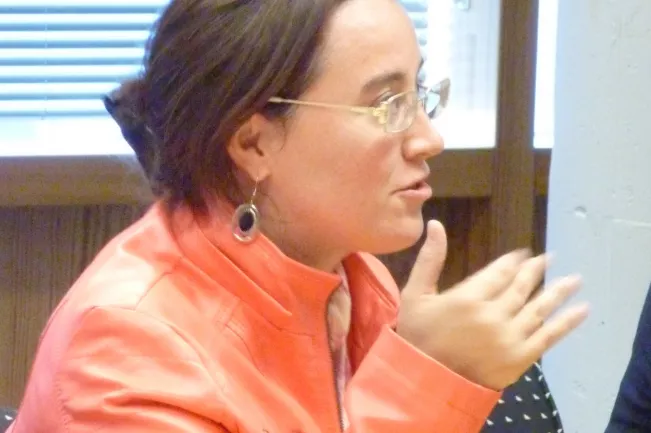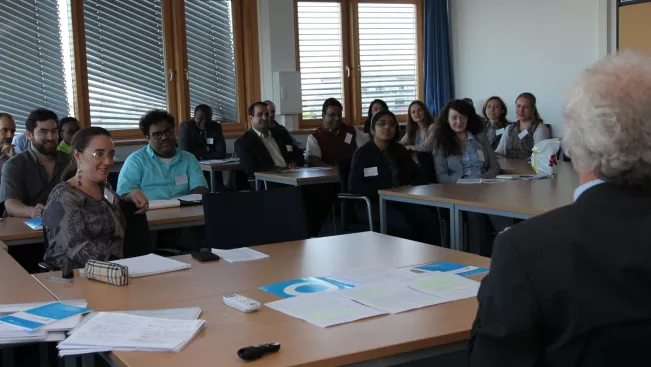Department of Management Sciences
Manuela Raatgerink, CSR & NGO Management

When Manuela Raatgerink first came to Germany from her home country Argentina, she didn’t know anyone. The World Youth Day 2005 in Cologne had drawn her here from Buenos Aires after completing her Bachelor degree in international relations and economics. She was 25 years old at the time, when for six months she helped to set up the Catholic mega-event, above all dealing with computer matters and coordinating other helpers from Latin America. “I simply wanted to make the world and the church a bit better,“ she says. A priest from the German Schönstatt movement, which endeavours to modernize the Catholic Church world-wide, had advised her in Buenos Aires that the World Youth Day would be a good opportunity to do so. This advice would change Raatgerink’s life – in conjunction with her hobby: couch-surfing.
Couch-surfers offer each other and total strangers accommodation via the internet for one or more nights, sometimes also including a shared meal - often in exchange for a reciprocal offer. This makes it easier to get to know people soon in a foreign town, while giving others the opportunity to do the same. Weekend excursions become affordable and convivial.
In this way Raatgerink quickly became acquainted with a lot of people: “I went to several Sunday brunches. So it only took a few weeks before I had settled into life in Germany. The people accepted me very warmly and admitted me into the whole culture. I experienced openness, tolerance and respect. And another thing - public life is well organized here. It became clear to me that I wanted to come back here to continue my studies, to see whether Germany might become my new home country.“

Meanwhile she was still working in Argentina for various companies in web-marketing, customer-service and logistics. Then in 2010 she returned to the German-speaking part of Europe - at first as an au pair in Bregenz on Lake Constance, Austria, from where she got involved in further church projects for the Schönstatt movement and where she also attended a German language course. Then she applied to study a Master’s course in Corporate Social Responsibility (CSR) and Non-governmental Organisation (NGO)-Management at the H-BRS in Rheinbach, because she wanted to specialize in development aid and understanding among nations.
In Bonn, where she rented a flat, she very soon made friends, too. No wonder with her Latin-American temperament: if you ever skyped with Manuela Raatgerink, you would see a whirlwind with glasses appear on the screen, wildly gesticulating with her mobile phone in her hand during the video-call – the image sways to and fro, while English words with her typical Spanish accent bubble and fizz out of the brown-haired Argentinian. Raatgerink is happy to talk about her life - not least because it can serve as an example to many migrants. It is no accident that exactly the kind of work she does mediating between cultures has become Raatgerink’s main job: she works in her new home country, the Netherlands, for a refugee organization.
The most important thing, it seems to her, is that foreigners who want to stay for a longer time should learn the language and, at least in public areas should adapt to the usual way of behaviour. “Syrians and Ethiopians, for example, have completely different ideas about political correctness from Germans or Dutch people. Or Latinos: in their native country they have to act very demanding when dealing with the authorities, in order to get things moving on their case. By contrast, here that is counter-productive. Anyone who is too pushy here finds themselves stopped short, but wordlessly. I know this and address it by speaking openly. I regard myself as a mediator between bureaucracy and refugee, a kind of bridge in this new country.“
Raatgerink learnt everything she needs for her job at the H-BRS: in her studies she acquired the skills of management and coordination, in her side-job as student-assistant in the field of inter-cultural communication she developed an instinctive feeling for different cultures. “I have helped students from all over the world – above all from China, Japan and France – to find their way around here“, she says. She found working together with her boss, Eileen Küpper, particularly instructive. Irish-born Eileen teaches English and inter-cultural communication at the Rheinbach campus and coordinates the other tutors in the Language Centre. “She made me sensitive to the fact that you first have to figure out and understand a foreign culture, before you can properly understand the people.“
Raatgerink enjoyed her three years in Germany to the fullest, whether studying, working or in her private life. That is why she gladly accepted the invitation to take part in the alumni conference of the H-BRS in September 2015 and see all her old companions again. “Germany was the best time of my life and I would surely have stayed after graduation - if it hadn’t been for a certain man who turned up.“ It happened during another couch-surfing encounter: a group of Dutchmen wanted to spend a weekend in Bonn, offering a barbecue in the Rheinauen in exchange for two nights in sleeping bags on the floor. Raatgerink invited the five lads into her flat - and one of them became her husband only one year later, whom she followed to Enschede.
Once again the Argentinian showed the flexibility which distinguishes her: “It was obvious that he wouldn’t move in with me, but that I would go and live with him. Although it meant leaving Germany again, I can take such changes in my stride pretty well.“ Before then Raatgerink had already spent longer periods in Chile, Spain, the USA and South Africa; in addition to Spanish she speaks English, German, Portuguese, Italian and now also Dutch.
To a certain extent Raatgerink believes that her mother set an example by showing her the courage and strength which is needed for such leaps between cultures: “She was an incredibly strong woman, brought up my family as a single mother and got us through the economic crisis in Argentina by juggling three jobs at the same time. We moved seven times within the country and had to adapt to the new situation every time. That left its mark on me and it still motivates me today. I was always prepared to take risks and leave my comfort zone, especially considering what depths life has in store.“
Raatgerink hasn’t stood still in Holland, either – although her probable intention is now to stay there. At present she is still working part-time for the refugee organization, while also doing various projects, the last of which was working for the Argentinian agency La Machi, creating a marketing campaign for a development aid organization, which sends professional workers to Africa. However, Raatgerink would like to work full-time for the refugee organization as soon as possible, for which she is attending another language course: Dutch. “I live in the rural east of the Netherlands. Here, in addition to English, you really need to be able to speak the national language - if only for internal communication. What is more, I want to be fully integrated and do a proper “Dutch“ job.“ Raatgerink believes that in order to find a new home in a country, you not only bring the good sides of your own culture, but should also fully immerse yourself in the new culture. This would then enable her to give more back: „There are more opportunities to get a good job, and it’s possible that the culture has something to teach me, which also contributes to my personal maturity.“
It is possible that a full-time job for the refugee organization might turn out to be a stop-over on the way to something else for Raatgerink. Privately she dreams of going into politics, perhaps at EU level. “Granted that the Germans and Dutch are very tolerant - none the less I witness time and again that there is a lack of inter-cultural understanding and communication. Many political problems result from a lack of knowledge. It would be a dream if I could give something back to Europe which I have experienced - and if every refugee had it as good as I have.“
No sooner has Manuela Raatgerink said that, than the bell rings at her door. „That’s my driving instructor, I have to go“, she says. She isn’t at all shy, but is always interested in learning new things: this 35-year-old woman is now preparing for her driving licence.
by Jan Berndorff